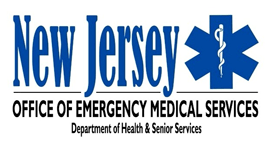New Jersey OEMS Certification Platform – Old Site
Please click here if you need to verify an individual’s certification
Please click here to view the course catalog
DHSS Home Page – Department of Health and Senior Services
Air Medical Services |
 The New Jersey air medical program originated in 1988 using hospital-based advanced life support paramedics as medical crew and New Jersey State Police (NJSP) Officers as pilots.The system consists of two dedicated, medically configured Sikorsky S76-B helicopters with an additional helicopter serving as a dedicated back-up. The Sikorsky helicopters are capable of flying at speeds up to 175 miles per hour. The helicopters are owned, piloted, and maintained by the NJSP Aviation Unit, which is responsible for the oversight of all aviation aspects of the program.In 2005, several private air medical providers became licensed to provide air medical coverage, primarily as inter-facility transports, but able to back-up the NJSP helicopters for scene 911 if necessary.History The New Jersey air medical program originated in 1988 using hospital-based advanced life support paramedics as medical crew and New Jersey State Police (NJSP) Officers as pilots.The system consists of two dedicated, medically configured Sikorsky S76-B helicopters with an additional helicopter serving as a dedicated back-up. The Sikorsky helicopters are capable of flying at speeds up to 175 miles per hour. The helicopters are owned, piloted, and maintained by the NJSP Aviation Unit, which is responsible for the oversight of all aviation aspects of the program.In 2005, several private air medical providers became licensed to provide air medical coverage, primarily as inter-facility transports, but able to back-up the NJSP helicopters for scene 911 if necessary.History
The New Jersey Emergency Medical Services Helicopter Response Program is a joint program that was established by the Legislature pursuant to P.L. 1986, c.106, in order to provide rapid emergency transport and care for trauma patients in New Jersey. The program is operated by:
Operations NorthSTAR is the Sikorsky helicopter designated to cover the northern portion of New Jersey and is based at Somerset Airport. The medical component of NorthSTAR is provided by the Emergency Medical Services Department of University Hospital with medical direction provided by the Level I trauma center located at the hospital. SouthSTAR is located on the grounds of the West Jersey Health System’s hospital at Voorhees. The medical component of SouthSTAR is provided by the Mobile Intensive Care Unit Program of Virtua Health System. Medical direction for trauma patients is provided by the Level I trauma center located at Cooper Hospital/University Medical Center, Camden. The service provides both on-scene landings (primarily to motor vehicle crash sites) and inter-hospital transfers (primarily for medical conditions). In addition to the two NJSP pilots, the crew consists of one flight paramedic and one flight nurse who have been specifically trained to work in the air medical environment. The availability of advanced level care and the speed of the helicopters increases patients’ chances of survival. The Commissioner of Health and Senior Services is advised on the operation of all air medical activities by a select subcommittee of the Mobile Intensive Care Advisory Council, which was established in accordance with N.J.S.A. 26:2K-16. This subcommittee is comprised of all the parties involved in the New Jersey Emergency Medical Services Helicopter Response Program, as well as representatives of the designated Level I trauma centers, the Office of the Attorney General and staff from the Office of Emergency Medical Services. The committee monitors the status of the program and makes periodic recommendations on medical and operational matters. Funding Historically, allocated funds have been insufficient to cover the operating expenses of this program, both during the early years of the program and since the establishment of the dedicated helicopter fund. Due to restrictions on the NJ State Police Aviation Unit, only public funds may be used to support the aviation activities of the program. In order to close the budget shortfall, the mobile intensive care unit (MICU) hospitals providing the medical component were directed to bill the patient for medical services provided when patients are transported by the program. This fixed charge represents only a portion of the cost of the medical services provided during the flight, and is billed in a manner similar to the billing of patients treated by ground-based MICUs. Effective September 14, 1999 , the charge was increased from $535 to $1337 to cover a larger share of medical expenses and reduce the burden on the helicopter fund. All MICUs are required to bill the patient for the medical services they receive; in this regard, the air medical program differs from ground-based MICUs only in the mode of transportation. This also differs from other helicopter services operated by out-of-state hospitals, which charge in excess of $7,000 per flight. |


 Program services were initiated in July 1988 and operated on a 16-hour per day schedule through October 1992. During this time, the program was funded from state general revenue through the budgets of the DHSS and NJDL&PS. In August 1992, the Legislature authorized a dedicated funding source for the operation of the program in the form of a $1 surcharge on all motor vehicle registrations in the state (P.L.1992, c.87). This dedicated fund, the New Jersey Emergency Medical Service Helicopter Response Program Fund, enabled the program to expand its operation to 24 hours a day.
Program services were initiated in July 1988 and operated on a 16-hour per day schedule through October 1992. During this time, the program was funded from state general revenue through the budgets of the DHSS and NJDL&PS. In August 1992, the Legislature authorized a dedicated funding source for the operation of the program in the form of a $1 surcharge on all motor vehicle registrations in the state (P.L.1992, c.87). This dedicated fund, the New Jersey Emergency Medical Service Helicopter Response Program Fund, enabled the program to expand its operation to 24 hours a day.